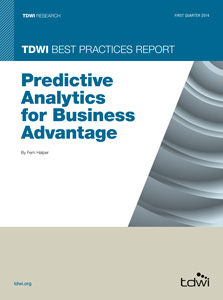
TDWI Best Practices Report | Predictive Analytics for Business Advantage
December 20, 2013
Although it has been around for decades, predictive analytics is a technology whose time has finally come. A variety of market forces have joined to make this possible, including an increase in computing power, a better understanding of the value of the technology, the rise of certain economic forces, and the advent of big data. Companies are looking to use the technology to predict trends and understand behavior for better business performance.
This TDWI Best Practices Report focuses on how organizations can and are using predictive analytics to derive business value. It provides in-depth survey analysis of current strategies and future trends for predictive analytics across both organizational and technical dimensions including organizational culture, infrastructure, data, and processes. It looks at the features and functionalities companies are using for predictive analytics and the infrastructure trends in this space. The report offers recommendations and best practices for successfully implementing predictive analytics in the organization.
TDWI Research finds a shift occurring in the predictive analytics user base. No longer is predictive analytics the realm of statisticians and mathematicians. There is a definite trend toward business analysts and other business users making use of this technology. Marketing and sales are big current users of predictive analytics and market analysts are making use of the technology. Therefore, the report also looks at the skills necessary to perform predictive analytics and how the technology can be utilized and operationalized across the organization. It explores cultural and business issues involved with making predictive analytics possible.
A unique feature of this report is its examination of the characteristics of companies that have actually measured either top-line or bottom-line impact with predictive analytics. In other words, it explores how those companies compare against those that haven’t measured value.